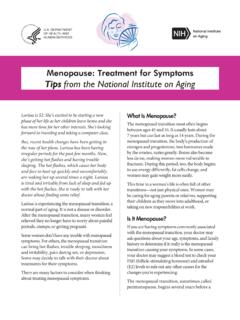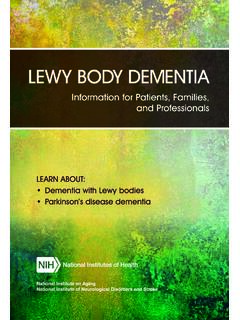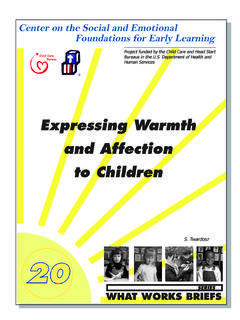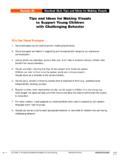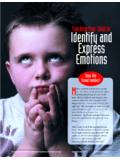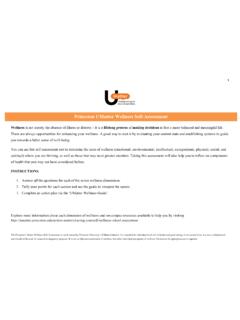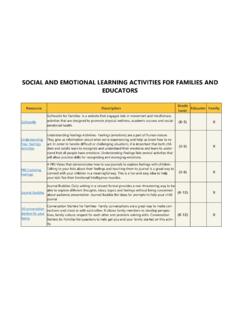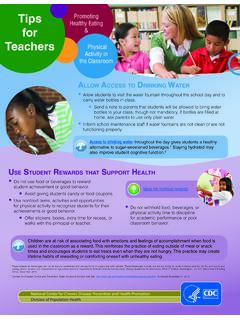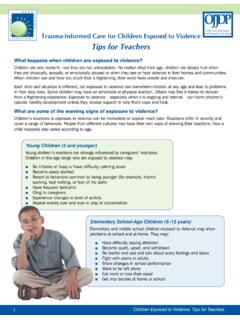Transcription of Understanding Loneliness and Social Isolation
1 From the National Institute on Aging at NIHU nderstanding Loneliness and Social IsolationHow to Stay Connected Introduction ..3 What are Loneliness and Social Isolation ? ..5 How Can Being Isolated or Feeling LonelyAffect a Person s Health? ..8 How Do I Know if I Am at Risk? ..13 What Can I Do To Stay Connected? ..19 For More Information ..24 Words To Know ..30 Use the Table of Contents to help you find things quickly. Page 24 has a list of resources for more information about Loneliness and Social Isolation . We also put some medical terms in bold, such as inflammation. You can find how to say these words and what they mean in the Words To Know section on page of Contents3As people age, they often find themselves spending more time alone. This can affect your health and well-being. Everyone needs Social connections to survive and booklet will help you learn about Loneliness and Social Isolation : What they are Health effects Risk factors How to stay connected if you or someone you love is isolated or feeling lonely Introduction4 Marvin s StoryAfter working 35 years as a teacher, Marvin looked forward to an active retirement with his wife, Sandra.
2 For many years, they enjoyed traveling, spending time with their grandchildren, and socializing with friends. Then Sandra developed breast cancer and passed away. Marvin had a difficult time coping with her death and didn t feel like socializing with their friends or going out to do things on his number of older adults age 65 and older is growing, and many are socially isolated and regularly feel lonely. The coronavirus outbreak in 2020 brought even more challenges due to health considerations and the need to practice physical distancing. Social Isolation and Loneliness are different, but related. Social Isolation is the lack of Social contacts and having few people to interact with regularly. Loneliness is the distressing feeling of being alone or separated. It s possible to feel lonely while among other people, and you can live alone and not feel lonely or socially isolated. Older adults are at higher risk for Social Isolation and Loneliness due to changes in health and Social connections that can come with growing older, hearing, vision, and memory loss, disability, trouble getting around, and/or the loss of family and friends.
3 What Are Loneliness and Social Isolation ? 6If you are in poor health, you may be more likely to be socially isolated or lonely. And, if you are socially isolated or feeling lonely, it can also put your physical and mental health at who are lonely or socially isolated are less healthy, have longer hospital stays, end up readmitted to the hospital more often, and are more likely to die earlier than those with meaningful and supportive Social Connected During COVID-19 With the COVID-19 pandemic (global outbreak), maintaining safe distancing precautions has been challenging for everyone even people who are otherwise well-connected with large supportive Social health guidelines to keep physical distance from others have slowed down the spread of COVID-19, but they have also made it harder for people to see family and friends. Older adults are at greater risk of COVID-19, but it is also critically important for them to maintain active Social connections.
4 Reach out by phone, video, text, Social media, email, or letter to help everyone stay connected during this challenging time. Learn more at who are socially isolated or lonely are more likely to be admitted to nursing homes and the emergency room. Social Isolation and Loneliness also are associated with higher risks for: High blood pressure Heart disease Obesity Weakened immune functioning Anxiety People who are lonely or socially isolated may get too little exercise, drink too much alcohol, smoke, and often don t sleep well, which can increase the risk of heart disease, diabetes, obesity, high blood pressure, and other serious Can Being Isolated or Feeling Lonely Affect a Person s Health? Depression Cognitive decline Dementia, including Alzheimer s disease Death9 People who are lonely experience emotional pain. Losing a sense of connection and community can change the way a person sees the world.
5 Someone experiencing chronic Loneliness can feel threatened and mistrustful of others. Emotional pain can activate the same stress responses in the body as physical pain. When this goes on for a long time, it can lead to chronic inflammation and reduced immunity. This raises your risk of chronic diseases and can leave a person more vulnerable to some infectious diseases. Social Isolation and Loneliness may also be bad for brain health. Loneliness and Social Isolation have been linked to poorer cognitive function and higher risk for dementia, including and especially for Alzheimer s disease. Also, little Social activity and being alone most of the time may contribute to a decline in the ability to perform everyday tasks such as driving, paying bills, taking medicine, and for Staying Connected if You Are Living Alone With DementiaIf you or a loved one has dementia and lives alone, family members, friends, or other caregivers may be able to help in different ways.
6 Identify a person you trust, such as a neighbor, who can visit you regularly in-person or via a video call, and be an emergency contact. Learn about home- and community-based support and services from Social service agencies, local nonprofits, and Area Agencies on Aging. Stay connected with family and friends through video chats, email, and Social media. If you re not tech savvy, ask for help to learn. Talk with others who share common interests. Try a support group online or in person. Maybe your community has a memory caf you can visit a safe place to enjoy activities and socialize for people living with memory loss and their families and PrecautionsDuring the COVID-19 pandemic, take precautions to protect yourself and others. Wash your hands often with soap and water or use a hand sanitizer if soap and water are not available. Stay at least 6 feet from people who are not in your household. Cover your mouth and nose with a cloth face mask when around others.
7 Always cover your mouth and nose with a tissue when you sneeze or cough, or use the inside of your elbow if you do not have a tissue. Frequently clean and disinfect surfaces that you frequently touch each day. Stay at home when you feel ill. Read more at has been her father Oscar s caregiver ever since he was first diagnosed with Alzheimer s disease. As Oscar s condition has worsened, Elena must do more to help, including helping him with bathing and dressing, taking him to the doctor, and preparing his meals. While she feels lucky to be caring for Oscar, Elena often feels overwhelmed and distant from her friends. She no longer has time to spend with them and is often too tired to do so even if she s Story13 Those who find themselves unexpectedly isolated due to the illness of a loved one, separation from friends or family, loss of mobility, worsening vision or hearing problems, disability, or lack of mobility or access to transportation, are at particular risk of Loneliness and Social Isolation .
8 You also may be at greater risk if you: Live alone Can t leave your home Had a major loss or life change, such as the death of a spouse or partner or retirement Struggle with money Are a caregiver Have psychological or cognitive challenges Have limited Social support Live in a rural, unsafe, and/or hard-to-reach neighborhood Have language barriers where you live Experience age, racial, ethnic, sexual orientation, and/or gender identity discrimination where you live Are not meaningfully engaged in activities or are feeling a lack of purposeHow Do I Know if I Am at Risk? 14 Hearing Loss Can Make It Harder To Stay Connected People with hearing loss may find it hard to have conversations with friends and family. Many older adults have difficulty hearing, but some may not want to admit it. Those who can t hear well may withdraw from others because they feel frustrated, become depressed, or embarrassed. Sometimes, older adults are mistakenly thought to be confused, unresponsive, or uncooperative when the reality is that they don t hear communicating with others can lead to less interaction with people, Social Isolation , and higher rates of problems that are ignored or untreated can get worse.
9 If you have a hearing problem, see your doctor. Hearing aids, special training, certain medicines, and surgery are some of the treatments that can help. Read more at 15 Dealing with Grief, Mourning, and Depression Although it is normal to mourn when you have a loss, later life does not have to be a time of ongoing sadness or disconnection. Depression is a common problem among older adults, but it is not a normal part of aging. It is treatable, so let your doctor know about your feelings and ask about is especially important to get help with your loss to help prevent you from feeling overwhelmed. If you feel sad all the time, are unable to imagine life moving forward without your loved one, experience a general loss of interest in things you used to like to do, or if your sense of loss keeps you from doing your daily activities, let your doctor know. Also, tell your doctor about symptoms such as lack of energy, poor appetite, trouble sleeping, or little interest in life.
10 These could be signs of complicated grief or depression, both of which can be treated. Family and caring friends often can provide great support. There are also support groups where grieving people help each other. Also, remember to take good care of yourself: Try to eat well, exercise, get enough sleep, and do activities you With Your Doctor If you are feeling isolated or lonely a lot of the time, you may want to tell your doctor or health professional. Talking about your health with your doctor means sharing information about how you feel physically, emotionally, and mentally. Describing your symptoms can help your doctor identify the problem. Make sure to bring up your concerns. For example, let your doctor know about any major changes or stresses in your life, such as a divorce or the death of a loved we grow older, we may lose people in our lives, including spouses and cherished friends. Or, we may have to move away from home or give up favorite activities.
